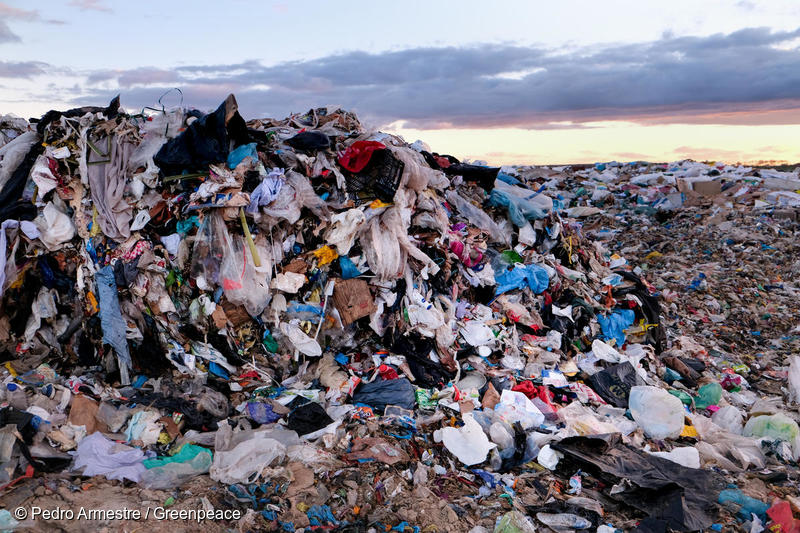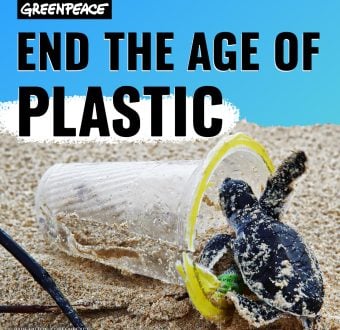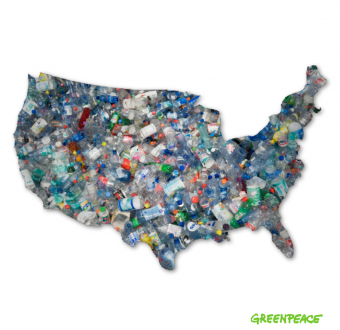Environmental and Health Groups Call on the Federal Trade Commission To Stop Companies From Making False Plastic Recycling Claims
Detailed Public Comments Submitted to the FTC Include Call for Honest Recycled Content Claims to Stop the Chemical Recycling Hoax
Today, six national environmental and health groups submitted 54 pages of detailed recommendations and extensive evidence in response to the Federal Trade Commission’s (FTC) solicitation of public comment on the Guides for the Use of Environmental Marketing Claims (known as the “Green Guides”). The comprehensive comments, submitted by The Last Beach Cleanup, Just Zero, Plastic Pollution Coalition, Beyond Plastics, Center for Biological Diversity, and Greenpeace USA, focus on recyclability and recycled content labels and claims on plastic products and packaging.
The commenting organizations are extremely concerned about the growing environmental and human health impacts associated with plastic production, waste, and pollution. Despite a dismal 5%-6% U.S. plastic recycling rate and rising public backlash about the prevalence of unrecyclable and single-use plastic products, companies continue to use plastic when designing and packaging their products.
The groups urge the Commission to:
- Strengthen the Green Guides requirements and initiate a formal rulemaking process to codify the Green Guides into law;
- Incorporate key provisions from California’s Truth in Labeling Law, which prohibits “Check Locally” and other deceptive labels, into federal regulation;
- Prohibit store drop-off labels unless the company can demonstrate that the program is proven to capture and recycle at least 75% of the covered materials; and
- Only define recycled plastic content based on actual physical content from materials that have passed through the hands of individual consumers. The FTC must prohibit the illegitimate “mass balance” approach promoted as part of the plastics industry’s false chemical recycling campaign.
Jackie Nunez, Advocacy & Engagement Manager, Plastic Pollution Coalition: “We provide clear and ample evidence of corporate deception on plastics, underscoring the need for the FTC to expand the scope of what is considered harm arising from deceitful, misleading, and false claims about recyclability of plastic products and packaging.”
Kelley Dennings, campaigner at the Center for Biological Diversity: “Plastic pollution caused by these fake labels is showing up in communities across the globe. False labels aren’t just superficial ‘greenwashing.’ They’re causing serious harm to ecosystems and human health around the world. We need to fix false recyclable labels and focus on waste prevention by stopping the proliferation of plastic factories and supporting reuse systems.”
Many companies are engaged in robust and deceptive advertising campaigns designed to convince consumers that worthless plastic waste such as flexible plastic packaging is recyclable.
Jan Dell, Founder of The Last Beach Cleanup: “For far too long, it’s been the wild, wild West of product claims and labeling with no sheriff in town. Numerous examples of false and misleading recycling labels used on plastic products and packaging are shown in our submission.”
Despite the Green Guides’ current recyclability requirements that only products and packaging that are collected, sorted, and processed into new materials may be labeled as “recyclable,” it appears that many product companies and retailers do not fear enforcement by the FTC, as they commonly employ false labels on plastic packaging.
Peter Blair, Policy Director with Just Zero: “The Commission has a critical role in protecting the public from misleading, deceptive, and false marketing claims regarding the recyclability of products and packaging. The Green Guides play a vital role in preventing misinformation from companies regarding the recyclability of their products. The FTC should initiate a formal rulemaking process to codify the Green Guides into enforceable law.”
Judith Enck, Beyond Plastics: “The chemical lobbyists have created a new hoax to try to convince the FTC to allow chemical recycling to count as recycling. This is a critical issue, and the FTC should forcefully reject this shameless attempt to fool the public. I am counting on the FTC to see through this industry ploy and get back to the pressing issue of blocking deceptive advertising when it comes to recycling. This is especially a problem with plastic packaging.”
John Hocevar, Greenpeace USA: “For too long, the U.S. government has allowed corporations to mislead the public with inaccurate or confusing product labels. The FTC now has an opportunity to fix that by ensuring that companies can no longer pretend all their throwaway plastic packaging is recyclable when the majority of it is destined for landfills and incinerators.”
# # #
Contacts:
Jan Dell, Founder and Independent Engineer, The Last Beach Cleanup: [email protected]
Peter Blair, Policy Director, Just Zero: [email protected]
Erica Cirino, Communications Manager Plastic Pollution Coalition: [email protected]
Judith Enck, President and former EPA Regional Administrator, Beyond Plastics: [email protected]
John Hocevar, Oceans Campaign Director, Greenpeace USA: [email protected]
Kelley Dennings, Center for Biological Diversity: [email protected]
Media contact: Tanya Brooks, Senior Communications Specialist at Greenpeace USA
(+1) 703-342-9226, [email protected]
Links to Submitted Documents:


